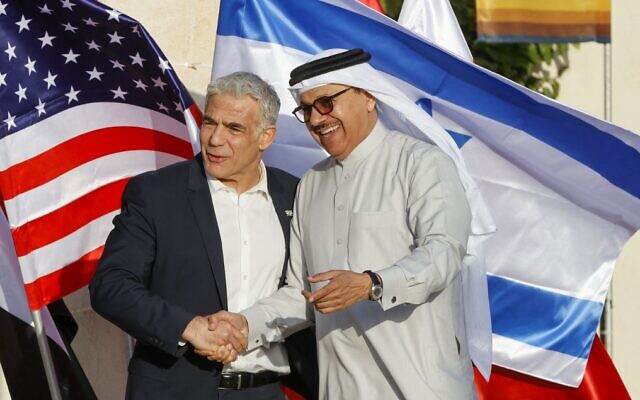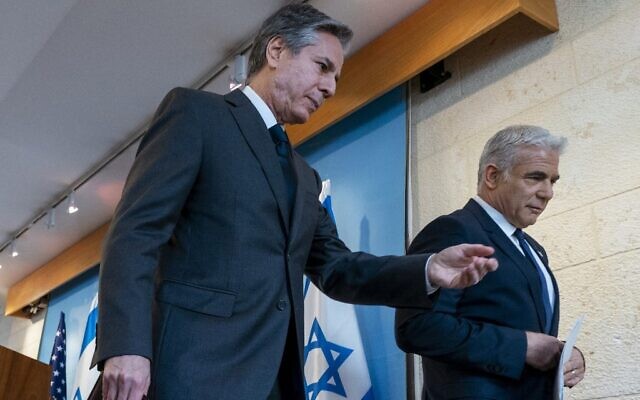The foreign ministers of Bahrain, the UAE, Morocco, and Egypt landed on Sunday evening in Israel ahead of a landmark regional summit in the southern Negev Desert, where they were joined by their Israeli counterpart, Yair Lapid.
US Secretary of State Antony Blinken arrived later in the evening at Kibbutz Sde Boker for the summit after landing in Israel on Saturday night.
Throughout Sunday, Blinken held meetings with Foreign Minister Yair Lapid, Prime Minister Naftali Bennett, President Isaac Herzog, Defense Minister Benny Gantz, and other senior Israeli officials, before travelling to Ramallah to meet with Palestinian Authority President Mahmoud Abbas.
The UAE’s Abdullah bin Zayed Al Nahyan, Bahrain’s Abdullatif bin Rashid Al-Zayani, Morocco’s Nasser Bourita, and Egypt’s Sameh Shoukry all landed at the Nevatim Air Base in southern Israel.
Shoukry, whose country was the first country to sign a peace agreement with Israel in 1979, joins the three Arab countries that signed the US-brokered normalization agreements known as the Abraham Accords in 2020.
From the airbase, the senior diplomats headed to the Isrotel Kedma Hotel in Sde Boker, where Lapid — who is hosting the two-day event — greeted them.
An official close to Lapid told journalists that the Israeli top diplomat and the Arab dignitaries were discussing “advancing a regional security architecture.”
Foreign Minister Yair Lapid (L) welcomes his Egyptian counterpart Minister Sameh Shoukri at Sde Boker in southern Israel on March 27, 2022, ahead of the Negev Summit. (Jack Guez/ AFP)
The alliance will deal with threats by “air, sea, and piracy,” the official said at a briefing.
The official added that the meetings so far have been “very warm, including embraces and friendly conversation.”
The senior diplomats were slated to dine together at the hotel after Blinken’s arrival.
Ahead of their arrival, the Kan public broadcaster reported that Israel raised its defense readiness in the south of the country amid concerns of aerial threats during the summit, with the Israeli Air Force putting several planes in the air as the diplomats were touching down.
Though the report did not specify the nature of the threats, the use of aircraft could indicate worries of a potential drone attack to be intercepted by the planes.
Israel’s first prime minister, David Ben-Gurion, lived at Sde Boker, and he and his wife, Paula, are buried there, overlooking the Zin wilderness. Lapid wants to take his guests to visit the gravesite, Kan reported, though that has not been confirmed as part of the itinerary.

Foreign Minister Yair Lapid (L) welcomes his Bahraini counterpart Abdullatif bin Rashid al-Zayani at Sde Boker in southern Israel on March 27, 2022, ahead of the Negev Summit. (Jack Guez/AFP)
The official did say that a visit will happen but did not specify whether all the visiting Arab ministers will participate.
The focus of the summit, according to officials, will be on regional threats, challenges, and opportunities. Among the issues expected to be at the center of the meetings are the Iran nuclear talks in Vienna, and the Russia-Ukraine war.
The summit is also seen as a display of diplomatic unity intended for Tehran.
On Monday, the foreign ministers will hold bilateral working meetings and will give statements to the press afterward.
Channel 12 news reported Sunday that Blinken said during his meetings with Israeli leaders that US President Joe Biden still has not decided whether to delist the Islamic Revolutionary Guard Corps as a foreign terror organization as part of a return to the Iran nuclear deal. According to the network, Blinken stressed that the United States would not return to the nuclear deal at any cost.
The report said Blinken also asked for Israel to step up its support of Ukraine, given the Russian invasion, including by considering providing military assistance.
Israel has so far only provided Kyiv with humanitarian aid, as the Jewish state tries to walk a tightrope to maintain good relations with both Ukraine and Russia.
The gathering is a “Lapid-led initiative,” a diplomatic source with knowledge of the preparations for the summit told The Times of Israel. “Obviously, the secretary [Blinken] being in Israel was the trigger.”

US Secretary of State Antony Blinken (L) walks by the side of Foreign Minister Yair Lapid, following a joint press conference at the Foreign Ministry in Jerusalem, on March 27, 2022. (Jacquelyn Martin / POOL / AFP)
According to a Saturday report by Channel 13, the region’s diplomats are expected to implore the US to project strength toward Iran, both in the nuclear arena and on its regional expansionist and destabilizing actions.
The report also said, without citing a source, that though Saudi Arabia is not publicly taking part in the conference — Riyadh has clandestine ties with Jerusalem, but not open relations — it is strongly involved behind the scenes, as the subjects under discussion also represent the kingdom’s interests.
Israel has made strengthening the Abraham Accords a top priority, scheduling regular diplomatic meetings with participant countries. Initial desires to finalize the normalization deal between Israel and Sudan have been complicated due to the military coup that spiraled the latter country further into crisis late last year.
The meeting of foreign ministers is taking place less than a week after Bennett traveled to the Sinai resort town of Sharm el-Sheikh for the first-ever trilateral summit with Egyptian President Abdel-Fattah el-Sissi and UAE Crown Prince Sheikh Mohammed bin Zayed Al Nahyan — another development that followed the signing of the Abraham Accords.
You’re a dedicated reader

We’re really pleased that you’ve read X Times of Israel articles in the past month.
That’s why we started the Times of Israel ten years ago – to provide discerning readers like you with must-read coverage of Israel and the Jewish world.
So now we have a request. Unlike other news outlets, we haven’t put up a paywall. But as the journalism we do is costly, we invite readers for whom The Times of Israel has become important to help support our work by joining The Times of Israel Community.
For as little as $6 a month you can help support our quality journalism while enjoying The Times of Israel AD-FREE, as well as accessing exclusive content available only to Times of Israel Community members.
Thank you,
David Horovitz, Founding Editor of The Times of Israel
Join Our Community Join Our Community Already a member? Sign in to stop seeing this

